Food Service Management: Management Practices in Food Service
VerifiedAdded on 2023/06/15
|14
|4238
|436
Report
AI Summary
This report provides a comprehensive analysis of food service management, focusing on the Clove Club restaurant as a case study. It explores various food supply chain approaches, highlighting critical stakeholders and discussing the principles of effective procurement and sourcing. The report also examines the application of analytical tools like SWOT and PESTLE to support effective management strategies and assesses different management practices that contribute to successful business operations. Furthermore, it delves into the ethical practices within food service organizations, specifically Clove Club, and evaluates their impact on overall business success. The report concludes with an assessment of management practices in Clove Club using performance review techniques and proposes alternative management strategies to improve performance, along with an implementation plan. Desklib offers this assignment as a resource for students studying food service management, providing access to past papers and solved assignments.
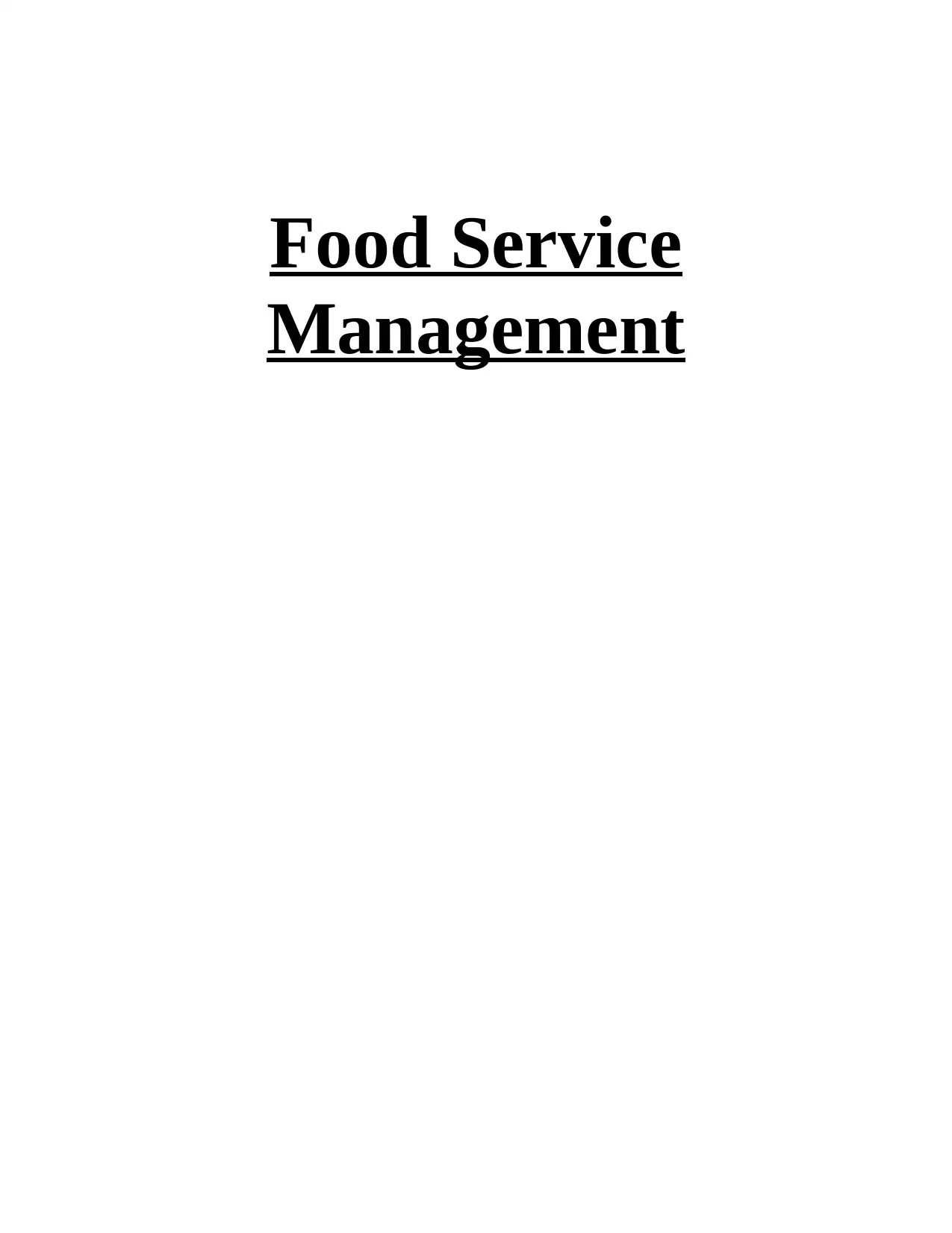
Food Service
Management
Management
Paraphrase This Document
Need a fresh take? Get an instant paraphrase of this document with our AI Paraphraser
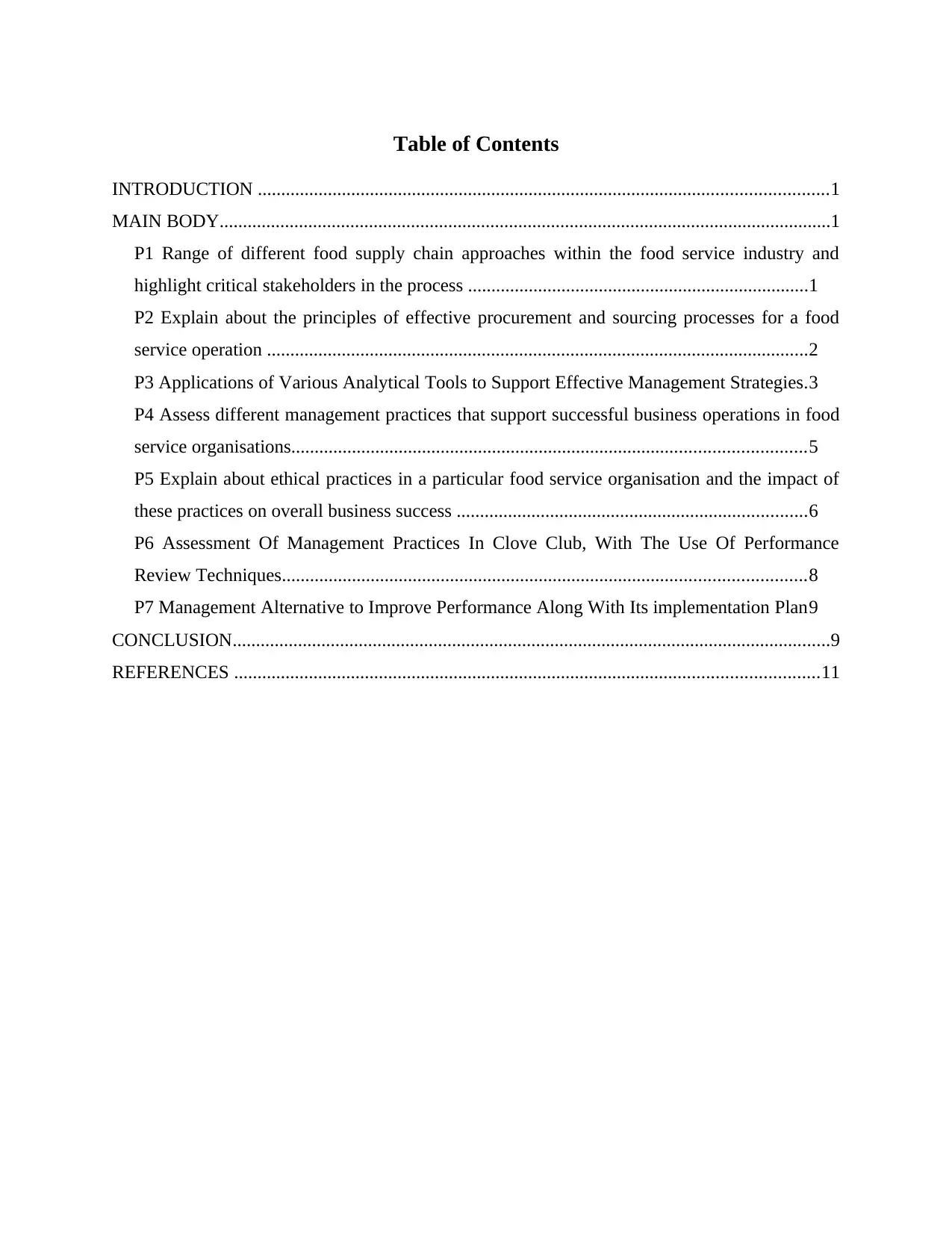
Table of Contents
INTRODUCTION ..........................................................................................................................1
MAIN BODY...................................................................................................................................1
P1 Range of different food supply chain approaches within the food service industry and
highlight critical stakeholders in the process .........................................................................1
P2 Explain about the principles of effective procurement and sourcing processes for a food
service operation ....................................................................................................................2
P3 Applications of Various Analytical Tools to Support Effective Management Strategies.3
P4 Assess different management practices that support successful business operations in food
service organisations..............................................................................................................5
P5 Explain about ethical practices in a particular food service organisation and the impact of
these practices on overall business success ...........................................................................6
P6 Assessment Of Management Practices In Clove Club, With The Use Of Performance
Review Techniques................................................................................................................8
P7 Management Alternative to Improve Performance Along With Its implementation Plan9
CONCLUSION................................................................................................................................9
REFERENCES .............................................................................................................................11
INTRODUCTION ..........................................................................................................................1
MAIN BODY...................................................................................................................................1
P1 Range of different food supply chain approaches within the food service industry and
highlight critical stakeholders in the process .........................................................................1
P2 Explain about the principles of effective procurement and sourcing processes for a food
service operation ....................................................................................................................2
P3 Applications of Various Analytical Tools to Support Effective Management Strategies.3
P4 Assess different management practices that support successful business operations in food
service organisations..............................................................................................................5
P5 Explain about ethical practices in a particular food service organisation and the impact of
these practices on overall business success ...........................................................................6
P6 Assessment Of Management Practices In Clove Club, With The Use Of Performance
Review Techniques................................................................................................................8
P7 Management Alternative to Improve Performance Along With Its implementation Plan9
CONCLUSION................................................................................................................................9
REFERENCES .............................................................................................................................11
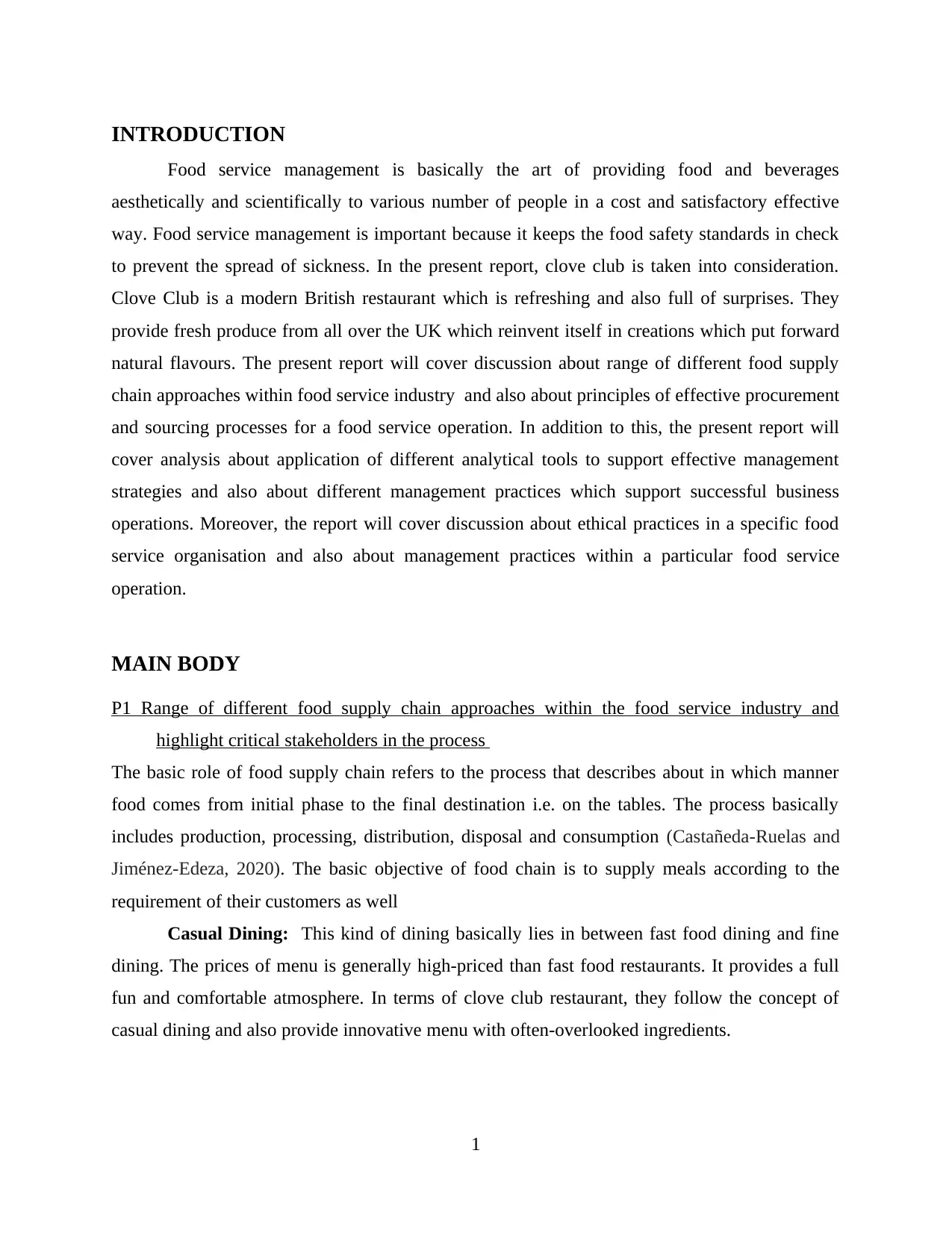
INTRODUCTION
Food service management is basically the art of providing food and beverages
aesthetically and scientifically to various number of people in a cost and satisfactory effective
way. Food service management is important because it keeps the food safety standards in check
to prevent the spread of sickness. In the present report, clove club is taken into consideration.
Clove Club is a modern British restaurant which is refreshing and also full of surprises. They
provide fresh produce from all over the UK which reinvent itself in creations which put forward
natural flavours. The present report will cover discussion about range of different food supply
chain approaches within food service industry and also about principles of effective procurement
and sourcing processes for a food service operation. In addition to this, the present report will
cover analysis about application of different analytical tools to support effective management
strategies and also about different management practices which support successful business
operations. Moreover, the report will cover discussion about ethical practices in a specific food
service organisation and also about management practices within a particular food service
operation.
MAIN BODY
P1 Range of different food supply chain approaches within the food service industry and
highlight critical stakeholders in the process
The basic role of food supply chain refers to the process that describes about in which manner
food comes from initial phase to the final destination i.e. on the tables. The process basically
includes production, processing, distribution, disposal and consumption (Castañeda-Ruelas and
Jiménez-Edeza, 2020). The basic objective of food chain is to supply meals according to the
requirement of their customers as well
Casual Dining: This kind of dining basically lies in between fast food dining and fine
dining. The prices of menu is generally high-priced than fast food restaurants. It provides a full
fun and comfortable atmosphere. In terms of clove club restaurant, they follow the concept of
casual dining and also provide innovative menu with often-overlooked ingredients.
1
Food service management is basically the art of providing food and beverages
aesthetically and scientifically to various number of people in a cost and satisfactory effective
way. Food service management is important because it keeps the food safety standards in check
to prevent the spread of sickness. In the present report, clove club is taken into consideration.
Clove Club is a modern British restaurant which is refreshing and also full of surprises. They
provide fresh produce from all over the UK which reinvent itself in creations which put forward
natural flavours. The present report will cover discussion about range of different food supply
chain approaches within food service industry and also about principles of effective procurement
and sourcing processes for a food service operation. In addition to this, the present report will
cover analysis about application of different analytical tools to support effective management
strategies and also about different management practices which support successful business
operations. Moreover, the report will cover discussion about ethical practices in a specific food
service organisation and also about management practices within a particular food service
operation.
MAIN BODY
P1 Range of different food supply chain approaches within the food service industry and
highlight critical stakeholders in the process
The basic role of food supply chain refers to the process that describes about in which manner
food comes from initial phase to the final destination i.e. on the tables. The process basically
includes production, processing, distribution, disposal and consumption (Castañeda-Ruelas and
Jiménez-Edeza, 2020). The basic objective of food chain is to supply meals according to the
requirement of their customers as well
Casual Dining: This kind of dining basically lies in between fast food dining and fine
dining. The prices of menu is generally high-priced than fast food restaurants. It provides a full
fun and comfortable atmosphere. In terms of clove club restaurant, they follow the concept of
casual dining and also provide innovative menu with often-overlooked ingredients.
1
⊘ This is a preview!⊘
Do you want full access?
Subscribe today to unlock all pages.

Trusted by 1+ million students worldwide
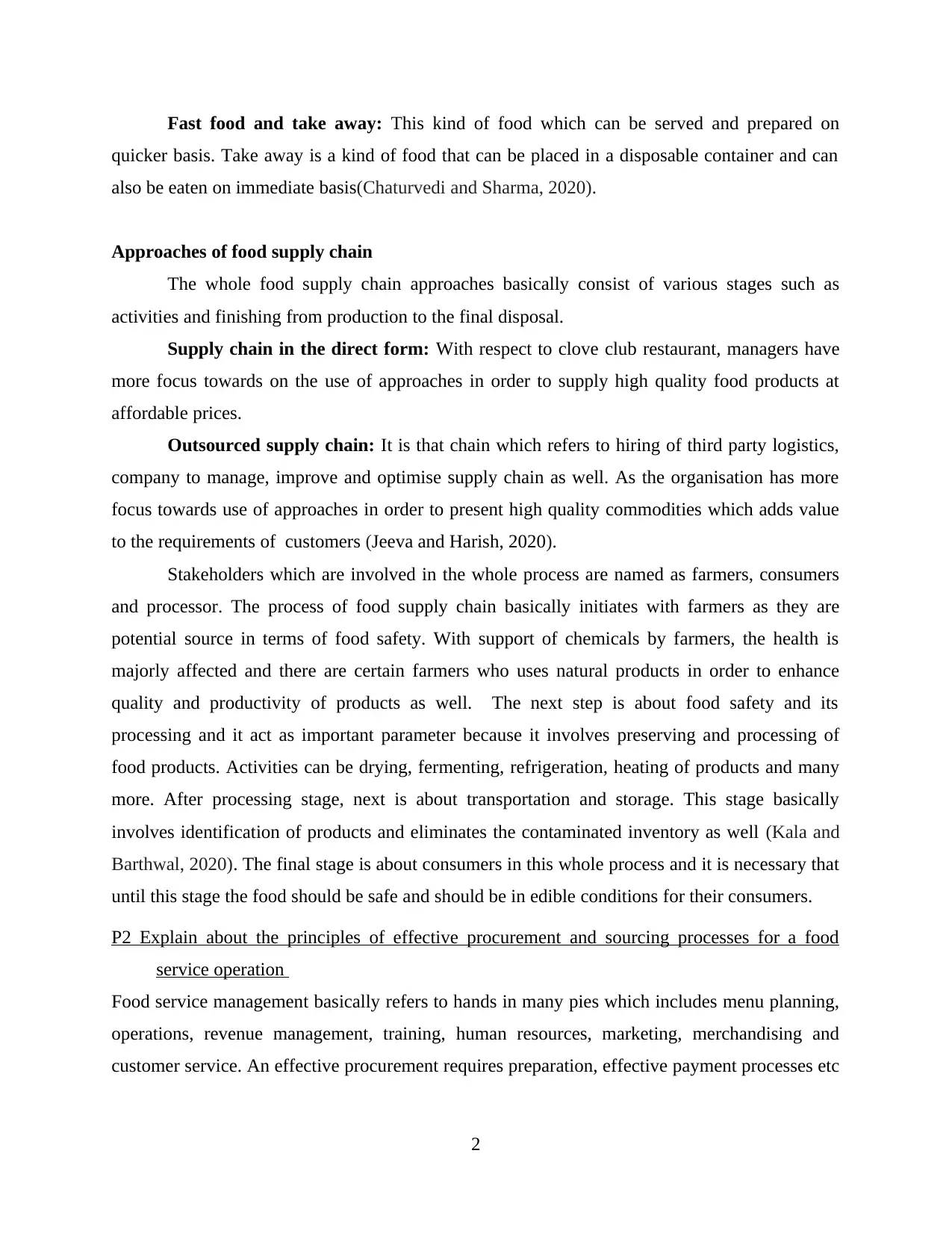
Fast food and take away: This kind of food which can be served and prepared on
quicker basis. Take away is a kind of food that can be placed in a disposable container and can
also be eaten on immediate basis(Chaturvedi and Sharma, 2020).
Approaches of food supply chain
The whole food supply chain approaches basically consist of various stages such as
activities and finishing from production to the final disposal.
Supply chain in the direct form: With respect to clove club restaurant, managers have
more focus towards on the use of approaches in order to supply high quality food products at
affordable prices.
Outsourced supply chain: It is that chain which refers to hiring of third party logistics,
company to manage, improve and optimise supply chain as well. As the organisation has more
focus towards use of approaches in order to present high quality commodities which adds value
to the requirements of customers (Jeeva and Harish, 2020).
Stakeholders which are involved in the whole process are named as farmers, consumers
and processor. The process of food supply chain basically initiates with farmers as they are
potential source in terms of food safety. With support of chemicals by farmers, the health is
majorly affected and there are certain farmers who uses natural products in order to enhance
quality and productivity of products as well. The next step is about food safety and its
processing and it act as important parameter because it involves preserving and processing of
food products. Activities can be drying, fermenting, refrigeration, heating of products and many
more. After processing stage, next is about transportation and storage. This stage basically
involves identification of products and eliminates the contaminated inventory as well (Kala and
Barthwal, 2020). The final stage is about consumers in this whole process and it is necessary that
until this stage the food should be safe and should be in edible conditions for their consumers.
P2 Explain about the principles of effective procurement and sourcing processes for a food
service operation
Food service management basically refers to hands in many pies which includes menu planning,
operations, revenue management, training, human resources, marketing, merchandising and
customer service. An effective procurement requires preparation, effective payment processes etc
2
quicker basis. Take away is a kind of food that can be placed in a disposable container and can
also be eaten on immediate basis(Chaturvedi and Sharma, 2020).
Approaches of food supply chain
The whole food supply chain approaches basically consist of various stages such as
activities and finishing from production to the final disposal.
Supply chain in the direct form: With respect to clove club restaurant, managers have
more focus towards on the use of approaches in order to supply high quality food products at
affordable prices.
Outsourced supply chain: It is that chain which refers to hiring of third party logistics,
company to manage, improve and optimise supply chain as well. As the organisation has more
focus towards use of approaches in order to present high quality commodities which adds value
to the requirements of customers (Jeeva and Harish, 2020).
Stakeholders which are involved in the whole process are named as farmers, consumers
and processor. The process of food supply chain basically initiates with farmers as they are
potential source in terms of food safety. With support of chemicals by farmers, the health is
majorly affected and there are certain farmers who uses natural products in order to enhance
quality and productivity of products as well. The next step is about food safety and its
processing and it act as important parameter because it involves preserving and processing of
food products. Activities can be drying, fermenting, refrigeration, heating of products and many
more. After processing stage, next is about transportation and storage. This stage basically
involves identification of products and eliminates the contaminated inventory as well (Kala and
Barthwal, 2020). The final stage is about consumers in this whole process and it is necessary that
until this stage the food should be safe and should be in edible conditions for their consumers.
P2 Explain about the principles of effective procurement and sourcing processes for a food
service operation
Food service management basically refers to hands in many pies which includes menu planning,
operations, revenue management, training, human resources, marketing, merchandising and
customer service. An effective procurement requires preparation, effective payment processes etc
2
Paraphrase This Document
Need a fresh take? Get an instant paraphrase of this document with our AI Paraphraser
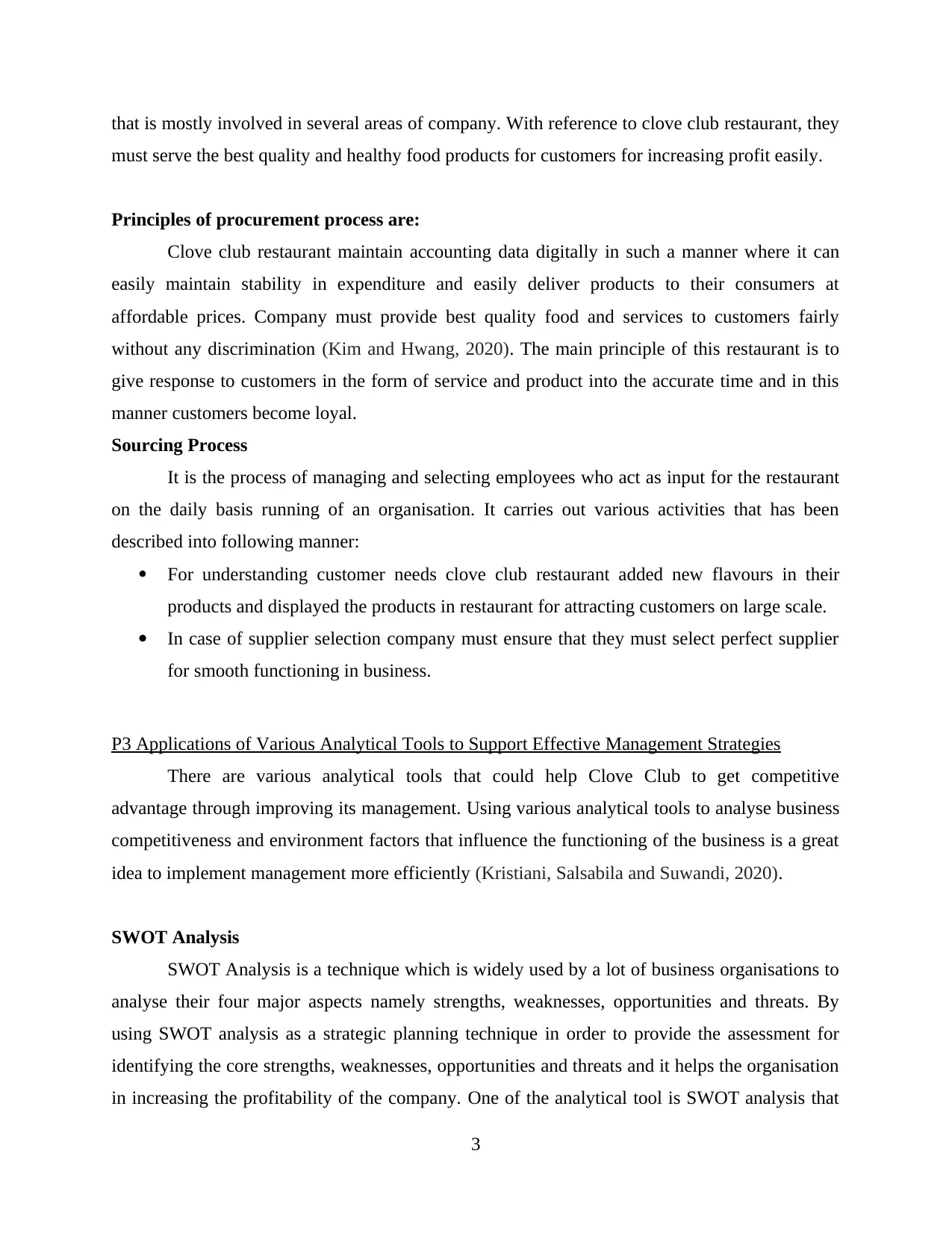
that is mostly involved in several areas of company. With reference to clove club restaurant, they
must serve the best quality and healthy food products for customers for increasing profit easily.
Principles of procurement process are:
Clove club restaurant maintain accounting data digitally in such a manner where it can
easily maintain stability in expenditure and easily deliver products to their consumers at
affordable prices. Company must provide best quality food and services to customers fairly
without any discrimination (Kim and Hwang, 2020). The main principle of this restaurant is to
give response to customers in the form of service and product into the accurate time and in this
manner customers become loyal.
Sourcing Process
It is the process of managing and selecting employees who act as input for the restaurant
on the daily basis running of an organisation. It carries out various activities that has been
described into following manner:
For understanding customer needs clove club restaurant added new flavours in their
products and displayed the products in restaurant for attracting customers on large scale.
In case of supplier selection company must ensure that they must select perfect supplier
for smooth functioning in business.
P3 Applications of Various Analytical Tools to Support Effective Management Strategies
There are various analytical tools that could help Clove Club to get competitive
advantage through improving its management. Using various analytical tools to analyse business
competitiveness and environment factors that influence the functioning of the business is a great
idea to implement management more efficiently (Kristiani, Salsabila and Suwandi, 2020).
SWOT Analysis
SWOT Analysis is a technique which is widely used by a lot of business organisations to
analyse their four major aspects namely strengths, weaknesses, opportunities and threats. By
using SWOT analysis as a strategic planning technique in order to provide the assessment for
identifying the core strengths, weaknesses, opportunities and threats and it helps the organisation
in increasing the profitability of the company. One of the analytical tool is SWOT analysis that
3
must serve the best quality and healthy food products for customers for increasing profit easily.
Principles of procurement process are:
Clove club restaurant maintain accounting data digitally in such a manner where it can
easily maintain stability in expenditure and easily deliver products to their consumers at
affordable prices. Company must provide best quality food and services to customers fairly
without any discrimination (Kim and Hwang, 2020). The main principle of this restaurant is to
give response to customers in the form of service and product into the accurate time and in this
manner customers become loyal.
Sourcing Process
It is the process of managing and selecting employees who act as input for the restaurant
on the daily basis running of an organisation. It carries out various activities that has been
described into following manner:
For understanding customer needs clove club restaurant added new flavours in their
products and displayed the products in restaurant for attracting customers on large scale.
In case of supplier selection company must ensure that they must select perfect supplier
for smooth functioning in business.
P3 Applications of Various Analytical Tools to Support Effective Management Strategies
There are various analytical tools that could help Clove Club to get competitive
advantage through improving its management. Using various analytical tools to analyse business
competitiveness and environment factors that influence the functioning of the business is a great
idea to implement management more efficiently (Kristiani, Salsabila and Suwandi, 2020).
SWOT Analysis
SWOT Analysis is a technique which is widely used by a lot of business organisations to
analyse their four major aspects namely strengths, weaknesses, opportunities and threats. By
using SWOT analysis as a strategic planning technique in order to provide the assessment for
identifying the core strengths, weaknesses, opportunities and threats and it helps the organisation
in increasing the profitability of the company. One of the analytical tool is SWOT analysis that
3
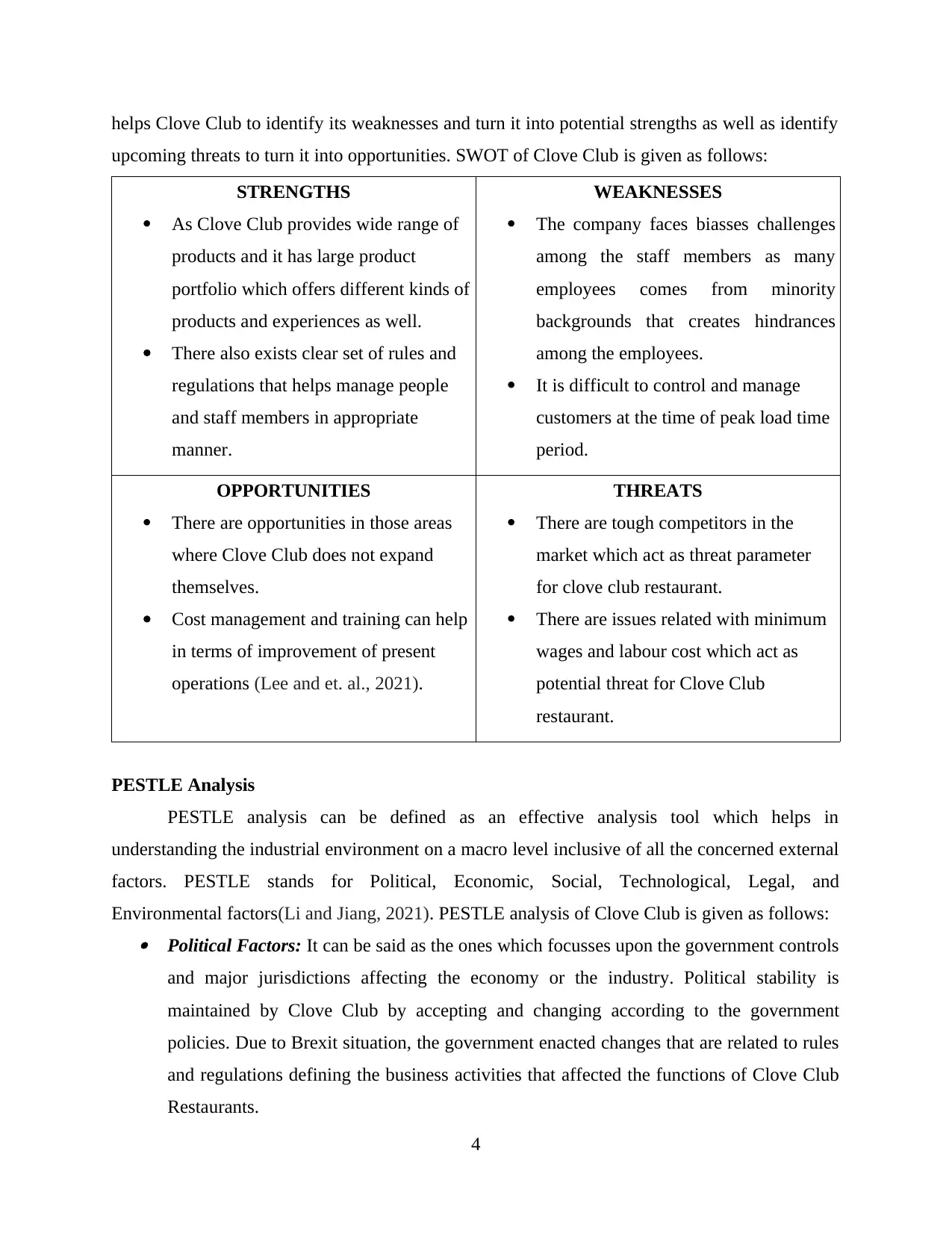
helps Clove Club to identify its weaknesses and turn it into potential strengths as well as identify
upcoming threats to turn it into opportunities. SWOT of Clove Club is given as follows:
STRENGTHS
As Clove Club provides wide range of
products and it has large product
portfolio which offers different kinds of
products and experiences as well.
There also exists clear set of rules and
regulations that helps manage people
and staff members in appropriate
manner.
WEAKNESSES
The company faces biasses challenges
among the staff members as many
employees comes from minority
backgrounds that creates hindrances
among the employees.
It is difficult to control and manage
customers at the time of peak load time
period.
OPPORTUNITIES
There are opportunities in those areas
where Clove Club does not expand
themselves.
Cost management and training can help
in terms of improvement of present
operations (Lee and et. al., 2021).
THREATS
There are tough competitors in the
market which act as threat parameter
for clove club restaurant.
There are issues related with minimum
wages and labour cost which act as
potential threat for Clove Club
restaurant.
PESTLE Analysis
PESTLE analysis can be defined as an effective analysis tool which helps in
understanding the industrial environment on a macro level inclusive of all the concerned external
factors. PESTLE stands for Political, Economic, Social, Technological, Legal, and
Environmental factors(Li and Jiang, 2021). PESTLE analysis of Clove Club is given as follows: Political Factors: It can be said as the ones which focusses upon the government controls
and major jurisdictions affecting the economy or the industry. Political stability is
maintained by Clove Club by accepting and changing according to the government
policies. Due to Brexit situation, the government enacted changes that are related to rules
and regulations defining the business activities that affected the functions of Clove Club
Restaurants.
4
upcoming threats to turn it into opportunities. SWOT of Clove Club is given as follows:
STRENGTHS
As Clove Club provides wide range of
products and it has large product
portfolio which offers different kinds of
products and experiences as well.
There also exists clear set of rules and
regulations that helps manage people
and staff members in appropriate
manner.
WEAKNESSES
The company faces biasses challenges
among the staff members as many
employees comes from minority
backgrounds that creates hindrances
among the employees.
It is difficult to control and manage
customers at the time of peak load time
period.
OPPORTUNITIES
There are opportunities in those areas
where Clove Club does not expand
themselves.
Cost management and training can help
in terms of improvement of present
operations (Lee and et. al., 2021).
THREATS
There are tough competitors in the
market which act as threat parameter
for clove club restaurant.
There are issues related with minimum
wages and labour cost which act as
potential threat for Clove Club
restaurant.
PESTLE Analysis
PESTLE analysis can be defined as an effective analysis tool which helps in
understanding the industrial environment on a macro level inclusive of all the concerned external
factors. PESTLE stands for Political, Economic, Social, Technological, Legal, and
Environmental factors(Li and Jiang, 2021). PESTLE analysis of Clove Club is given as follows: Political Factors: It can be said as the ones which focusses upon the government controls
and major jurisdictions affecting the economy or the industry. Political stability is
maintained by Clove Club by accepting and changing according to the government
policies. Due to Brexit situation, the government enacted changes that are related to rules
and regulations defining the business activities that affected the functions of Clove Club
Restaurants.
4
⊘ This is a preview!⊘
Do you want full access?
Subscribe today to unlock all pages.

Trusted by 1+ million students worldwide
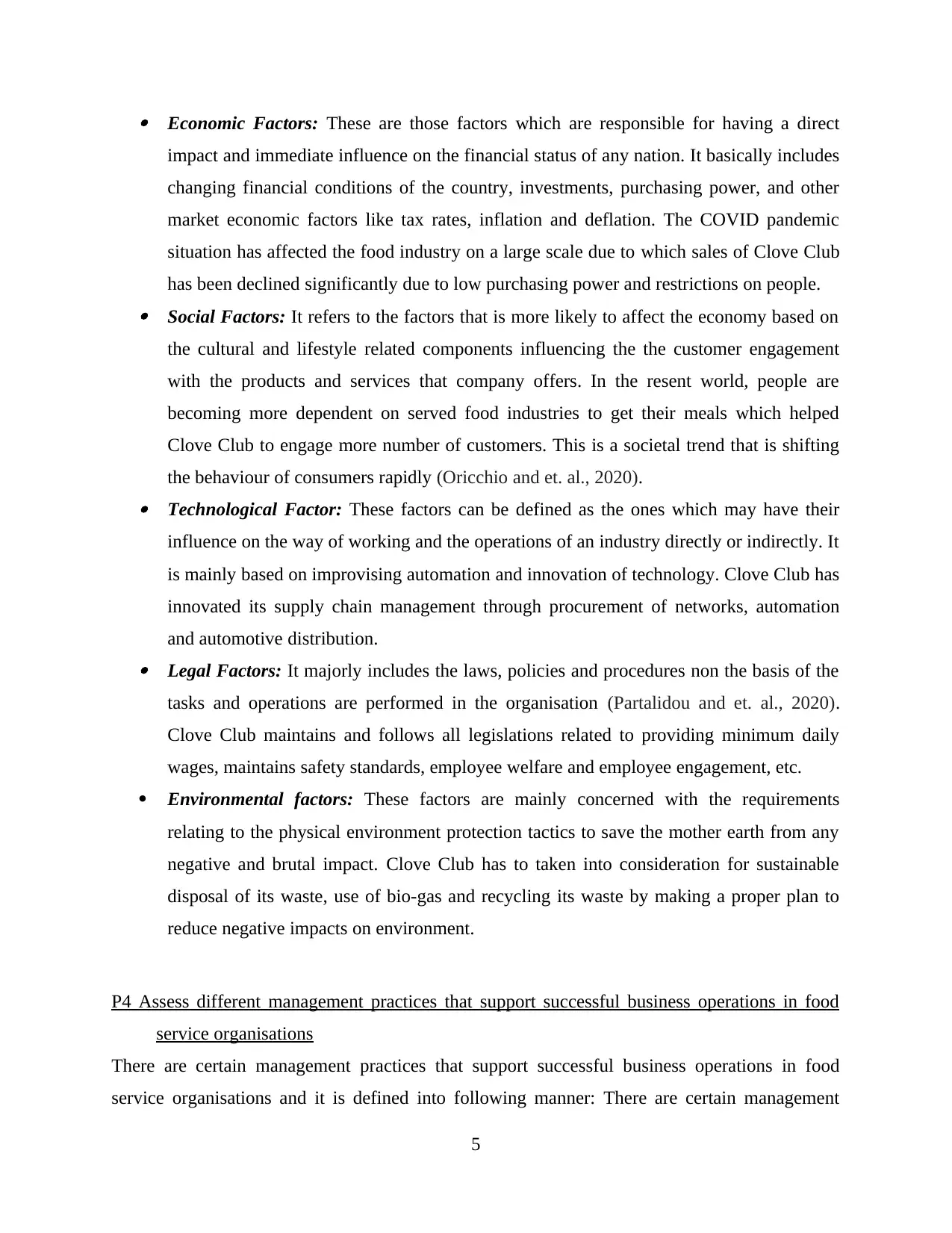
Economic Factors: These are those factors which are responsible for having a direct
impact and immediate influence on the financial status of any nation. It basically includes
changing financial conditions of the country, investments, purchasing power, and other
market economic factors like tax rates, inflation and deflation. The COVID pandemic
situation has affected the food industry on a large scale due to which sales of Clove Club
has been declined significantly due to low purchasing power and restrictions on people. Social Factors: It refers to the factors that is more likely to affect the economy based on
the cultural and lifestyle related components influencing the the customer engagement
with the products and services that company offers. In the resent world, people are
becoming more dependent on served food industries to get their meals which helped
Clove Club to engage more number of customers. This is a societal trend that is shifting
the behaviour of consumers rapidly (Oricchio and et. al., 2020). Technological Factor: These factors can be defined as the ones which may have their
influence on the way of working and the operations of an industry directly or indirectly. It
is mainly based on improvising automation and innovation of technology. Clove Club has
innovated its supply chain management through procurement of networks, automation
and automotive distribution. Legal Factors: It majorly includes the laws, policies and procedures non the basis of the
tasks and operations are performed in the organisation (Partalidou and et. al., 2020).
Clove Club maintains and follows all legislations related to providing minimum daily
wages, maintains safety standards, employee welfare and employee engagement, etc.
Environmental factors: These factors are mainly concerned with the requirements
relating to the physical environment protection tactics to save the mother earth from any
negative and brutal impact. Clove Club has to taken into consideration for sustainable
disposal of its waste, use of bio-gas and recycling its waste by making a proper plan to
reduce negative impacts on environment.
P4 Assess different management practices that support successful business operations in food
service organisations
There are certain management practices that support successful business operations in food
service organisations and it is defined into following manner: There are certain management
5
impact and immediate influence on the financial status of any nation. It basically includes
changing financial conditions of the country, investments, purchasing power, and other
market economic factors like tax rates, inflation and deflation. The COVID pandemic
situation has affected the food industry on a large scale due to which sales of Clove Club
has been declined significantly due to low purchasing power and restrictions on people. Social Factors: It refers to the factors that is more likely to affect the economy based on
the cultural and lifestyle related components influencing the the customer engagement
with the products and services that company offers. In the resent world, people are
becoming more dependent on served food industries to get their meals which helped
Clove Club to engage more number of customers. This is a societal trend that is shifting
the behaviour of consumers rapidly (Oricchio and et. al., 2020). Technological Factor: These factors can be defined as the ones which may have their
influence on the way of working and the operations of an industry directly or indirectly. It
is mainly based on improvising automation and innovation of technology. Clove Club has
innovated its supply chain management through procurement of networks, automation
and automotive distribution. Legal Factors: It majorly includes the laws, policies and procedures non the basis of the
tasks and operations are performed in the organisation (Partalidou and et. al., 2020).
Clove Club maintains and follows all legislations related to providing minimum daily
wages, maintains safety standards, employee welfare and employee engagement, etc.
Environmental factors: These factors are mainly concerned with the requirements
relating to the physical environment protection tactics to save the mother earth from any
negative and brutal impact. Clove Club has to taken into consideration for sustainable
disposal of its waste, use of bio-gas and recycling its waste by making a proper plan to
reduce negative impacts on environment.
P4 Assess different management practices that support successful business operations in food
service organisations
There are certain management practices that support successful business operations in food
service organisations and it is defined into following manner: There are certain management
5
Paraphrase This Document
Need a fresh take? Get an instant paraphrase of this document with our AI Paraphraser
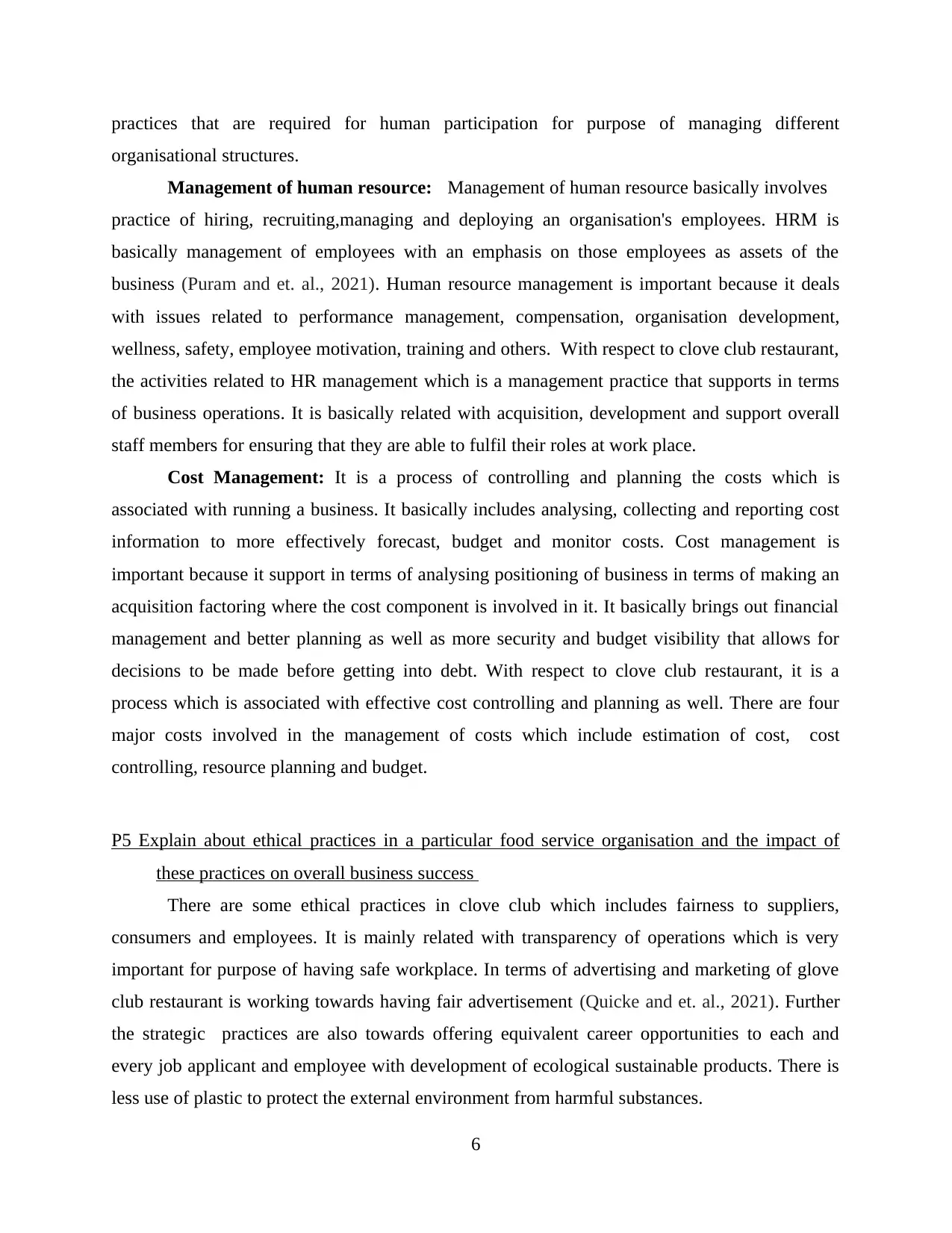
practices that are required for human participation for purpose of managing different
organisational structures.
Management of human resource: Management of human resource basically involves
practice of hiring, recruiting,managing and deploying an organisation's employees. HRM is
basically management of employees with an emphasis on those employees as assets of the
business (Puram and et. al., 2021). Human resource management is important because it deals
with issues related to performance management, compensation, organisation development,
wellness, safety, employee motivation, training and others. With respect to clove club restaurant,
the activities related to HR management which is a management practice that supports in terms
of business operations. It is basically related with acquisition, development and support overall
staff members for ensuring that they are able to fulfil their roles at work place.
Cost Management: It is a process of controlling and planning the costs which is
associated with running a business. It basically includes analysing, collecting and reporting cost
information to more effectively forecast, budget and monitor costs. Cost management is
important because it support in terms of analysing positioning of business in terms of making an
acquisition factoring where the cost component is involved in it. It basically brings out financial
management and better planning as well as more security and budget visibility that allows for
decisions to be made before getting into debt. With respect to clove club restaurant, it is a
process which is associated with effective cost controlling and planning as well. There are four
major costs involved in the management of costs which include estimation of cost, cost
controlling, resource planning and budget.
P5 Explain about ethical practices in a particular food service organisation and the impact of
these practices on overall business success
There are some ethical practices in clove club which includes fairness to suppliers,
consumers and employees. It is mainly related with transparency of operations which is very
important for purpose of having safe workplace. In terms of advertising and marketing of glove
club restaurant is working towards having fair advertisement (Quicke and et. al., 2021). Further
the strategic practices are also towards offering equivalent career opportunities to each and
every job applicant and employee with development of ecological sustainable products. There is
less use of plastic to protect the external environment from harmful substances.
6
organisational structures.
Management of human resource: Management of human resource basically involves
practice of hiring, recruiting,managing and deploying an organisation's employees. HRM is
basically management of employees with an emphasis on those employees as assets of the
business (Puram and et. al., 2021). Human resource management is important because it deals
with issues related to performance management, compensation, organisation development,
wellness, safety, employee motivation, training and others. With respect to clove club restaurant,
the activities related to HR management which is a management practice that supports in terms
of business operations. It is basically related with acquisition, development and support overall
staff members for ensuring that they are able to fulfil their roles at work place.
Cost Management: It is a process of controlling and planning the costs which is
associated with running a business. It basically includes analysing, collecting and reporting cost
information to more effectively forecast, budget and monitor costs. Cost management is
important because it support in terms of analysing positioning of business in terms of making an
acquisition factoring where the cost component is involved in it. It basically brings out financial
management and better planning as well as more security and budget visibility that allows for
decisions to be made before getting into debt. With respect to clove club restaurant, it is a
process which is associated with effective cost controlling and planning as well. There are four
major costs involved in the management of costs which include estimation of cost, cost
controlling, resource planning and budget.
P5 Explain about ethical practices in a particular food service organisation and the impact of
these practices on overall business success
There are some ethical practices in clove club which includes fairness to suppliers,
consumers and employees. It is mainly related with transparency of operations which is very
important for purpose of having safe workplace. In terms of advertising and marketing of glove
club restaurant is working towards having fair advertisement (Quicke and et. al., 2021). Further
the strategic practices are also towards offering equivalent career opportunities to each and
every job applicant and employee with development of ecological sustainable products. There is
less use of plastic to protect the external environment from harmful substances.
6
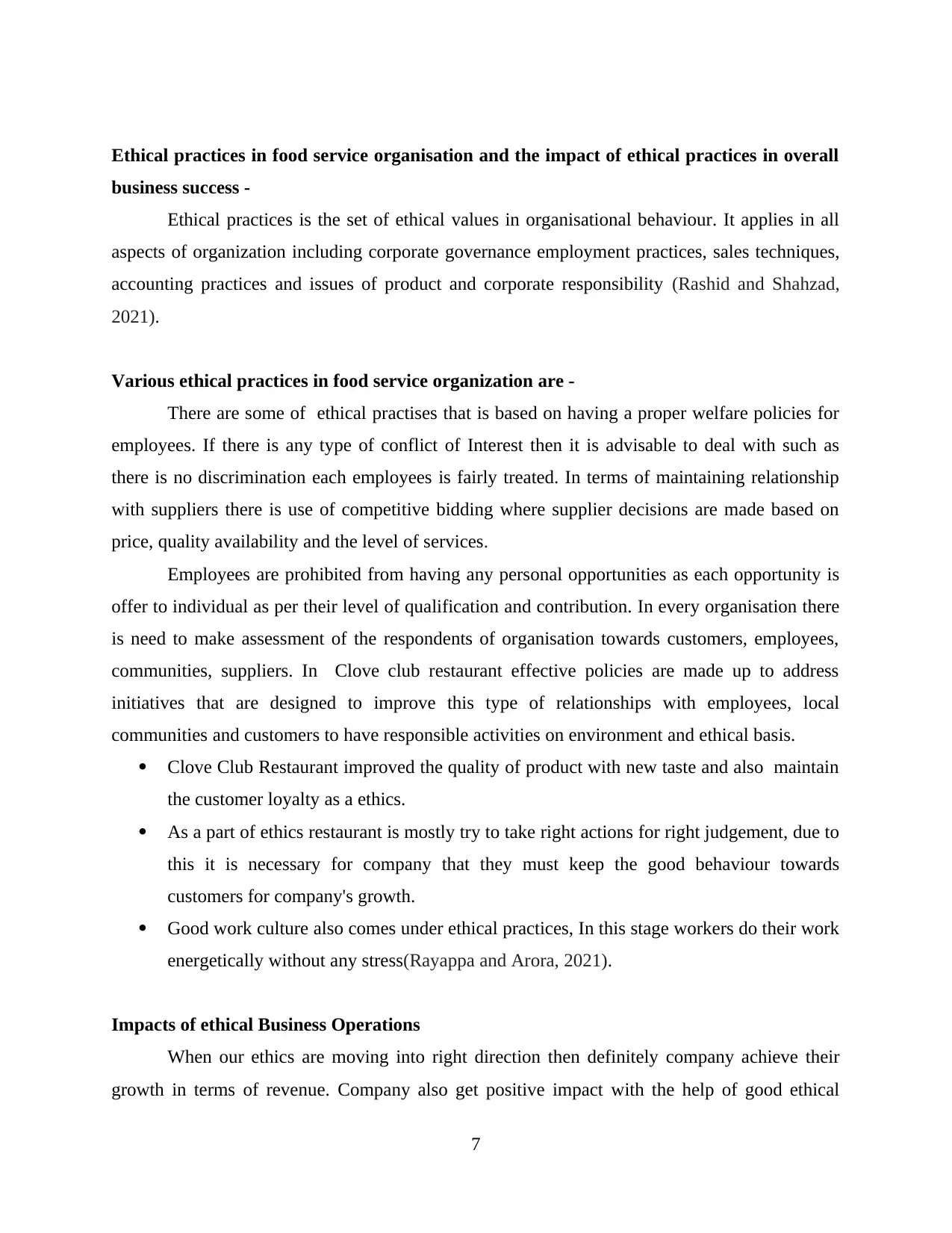
Ethical practices in food service organisation and the impact of ethical practices in overall
business success -
Ethical practices is the set of ethical values in organisational behaviour. It applies in all
aspects of organization including corporate governance employment practices, sales techniques,
accounting practices and issues of product and corporate responsibility (Rashid and Shahzad,
2021).
Various ethical practices in food service organization are -
There are some of ethical practises that is based on having a proper welfare policies for
employees. If there is any type of conflict of Interest then it is advisable to deal with such as
there is no discrimination each employees is fairly treated. In terms of maintaining relationship
with suppliers there is use of competitive bidding where supplier decisions are made based on
price, quality availability and the level of services.
Employees are prohibited from having any personal opportunities as each opportunity is
offer to individual as per their level of qualification and contribution. In every organisation there
is need to make assessment of the respondents of organisation towards customers, employees,
communities, suppliers. In Clove club restaurant effective policies are made up to address
initiatives that are designed to improve this type of relationships with employees, local
communities and customers to have responsible activities on environment and ethical basis.
Clove Club Restaurant improved the quality of product with new taste and also maintain
the customer loyalty as a ethics.
As a part of ethics restaurant is mostly try to take right actions for right judgement, due to
this it is necessary for company that they must keep the good behaviour towards
customers for company's growth.
Good work culture also comes under ethical practices, In this stage workers do their work
energetically without any stress(Rayappa and Arora, 2021).
Impacts of ethical Business Operations
When our ethics are moving into right direction then definitely company achieve their
growth in terms of revenue. Company also get positive impact with the help of good ethical
7
business success -
Ethical practices is the set of ethical values in organisational behaviour. It applies in all
aspects of organization including corporate governance employment practices, sales techniques,
accounting practices and issues of product and corporate responsibility (Rashid and Shahzad,
2021).
Various ethical practices in food service organization are -
There are some of ethical practises that is based on having a proper welfare policies for
employees. If there is any type of conflict of Interest then it is advisable to deal with such as
there is no discrimination each employees is fairly treated. In terms of maintaining relationship
with suppliers there is use of competitive bidding where supplier decisions are made based on
price, quality availability and the level of services.
Employees are prohibited from having any personal opportunities as each opportunity is
offer to individual as per their level of qualification and contribution. In every organisation there
is need to make assessment of the respondents of organisation towards customers, employees,
communities, suppliers. In Clove club restaurant effective policies are made up to address
initiatives that are designed to improve this type of relationships with employees, local
communities and customers to have responsible activities on environment and ethical basis.
Clove Club Restaurant improved the quality of product with new taste and also maintain
the customer loyalty as a ethics.
As a part of ethics restaurant is mostly try to take right actions for right judgement, due to
this it is necessary for company that they must keep the good behaviour towards
customers for company's growth.
Good work culture also comes under ethical practices, In this stage workers do their work
energetically without any stress(Rayappa and Arora, 2021).
Impacts of ethical Business Operations
When our ethics are moving into right direction then definitely company achieve their
growth in terms of revenue. Company also get positive impact with the help of good ethical
7
⊘ This is a preview!⊘
Do you want full access?
Subscribe today to unlock all pages.

Trusted by 1+ million students worldwide
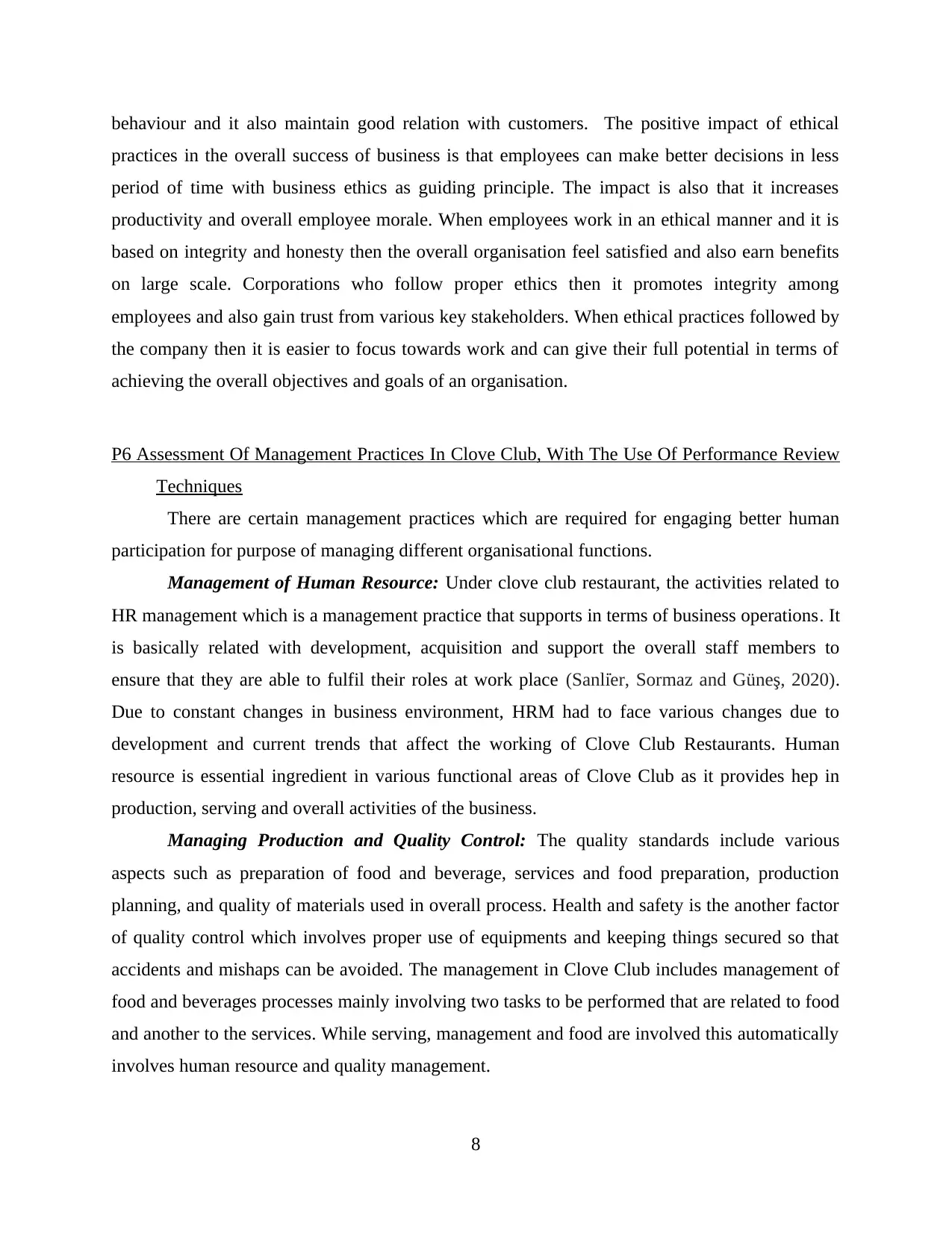
behaviour and it also maintain good relation with customers. The positive impact of ethical
practices in the overall success of business is that employees can make better decisions in less
period of time with business ethics as guiding principle. The impact is also that it increases
productivity and overall employee morale. When employees work in an ethical manner and it is
based on integrity and honesty then the overall organisation feel satisfied and also earn benefits
on large scale. Corporations who follow proper ethics then it promotes integrity among
employees and also gain trust from various key stakeholders. When ethical practices followed by
the company then it is easier to focus towards work and can give their full potential in terms of
achieving the overall objectives and goals of an organisation.
P6 Assessment Of Management Practices In Clove Club, With The Use Of Performance Review
Techniques
There are certain management practices which are required for engaging better human
participation for purpose of managing different organisational functions.
Management of Human Resource: Under clove club restaurant, the activities related to
HR management which is a management practice that supports in terms of business operations. It
is basically related with development, acquisition and support the overall staff members to
ensure that they are able to fulfil their roles at work place (Sanli̇er, Sormaz and Güneş, 2020).
Due to constant changes in business environment, HRM had to face various changes due to
development and current trends that affect the working of Clove Club Restaurants. Human
resource is essential ingredient in various functional areas of Clove Club as it provides hep in
production, serving and overall activities of the business.
Managing Production and Quality Control: The quality standards include various
aspects such as preparation of food and beverage, services and food preparation, production
planning, and quality of materials used in overall process. Health and safety is the another factor
of quality control which involves proper use of equipments and keeping things secured so that
accidents and mishaps can be avoided. The management in Clove Club includes management of
food and beverages processes mainly involving two tasks to be performed that are related to food
and another to the services. While serving, management and food are involved this automatically
involves human resource and quality management.
8
practices in the overall success of business is that employees can make better decisions in less
period of time with business ethics as guiding principle. The impact is also that it increases
productivity and overall employee morale. When employees work in an ethical manner and it is
based on integrity and honesty then the overall organisation feel satisfied and also earn benefits
on large scale. Corporations who follow proper ethics then it promotes integrity among
employees and also gain trust from various key stakeholders. When ethical practices followed by
the company then it is easier to focus towards work and can give their full potential in terms of
achieving the overall objectives and goals of an organisation.
P6 Assessment Of Management Practices In Clove Club, With The Use Of Performance Review
Techniques
There are certain management practices which are required for engaging better human
participation for purpose of managing different organisational functions.
Management of Human Resource: Under clove club restaurant, the activities related to
HR management which is a management practice that supports in terms of business operations. It
is basically related with development, acquisition and support the overall staff members to
ensure that they are able to fulfil their roles at work place (Sanli̇er, Sormaz and Güneş, 2020).
Due to constant changes in business environment, HRM had to face various changes due to
development and current trends that affect the working of Clove Club Restaurants. Human
resource is essential ingredient in various functional areas of Clove Club as it provides hep in
production, serving and overall activities of the business.
Managing Production and Quality Control: The quality standards include various
aspects such as preparation of food and beverage, services and food preparation, production
planning, and quality of materials used in overall process. Health and safety is the another factor
of quality control which involves proper use of equipments and keeping things secured so that
accidents and mishaps can be avoided. The management in Clove Club includes management of
food and beverages processes mainly involving two tasks to be performed that are related to food
and another to the services. While serving, management and food are involved this automatically
involves human resource and quality management.
8
Paraphrase This Document
Need a fresh take? Get an instant paraphrase of this document with our AI Paraphraser
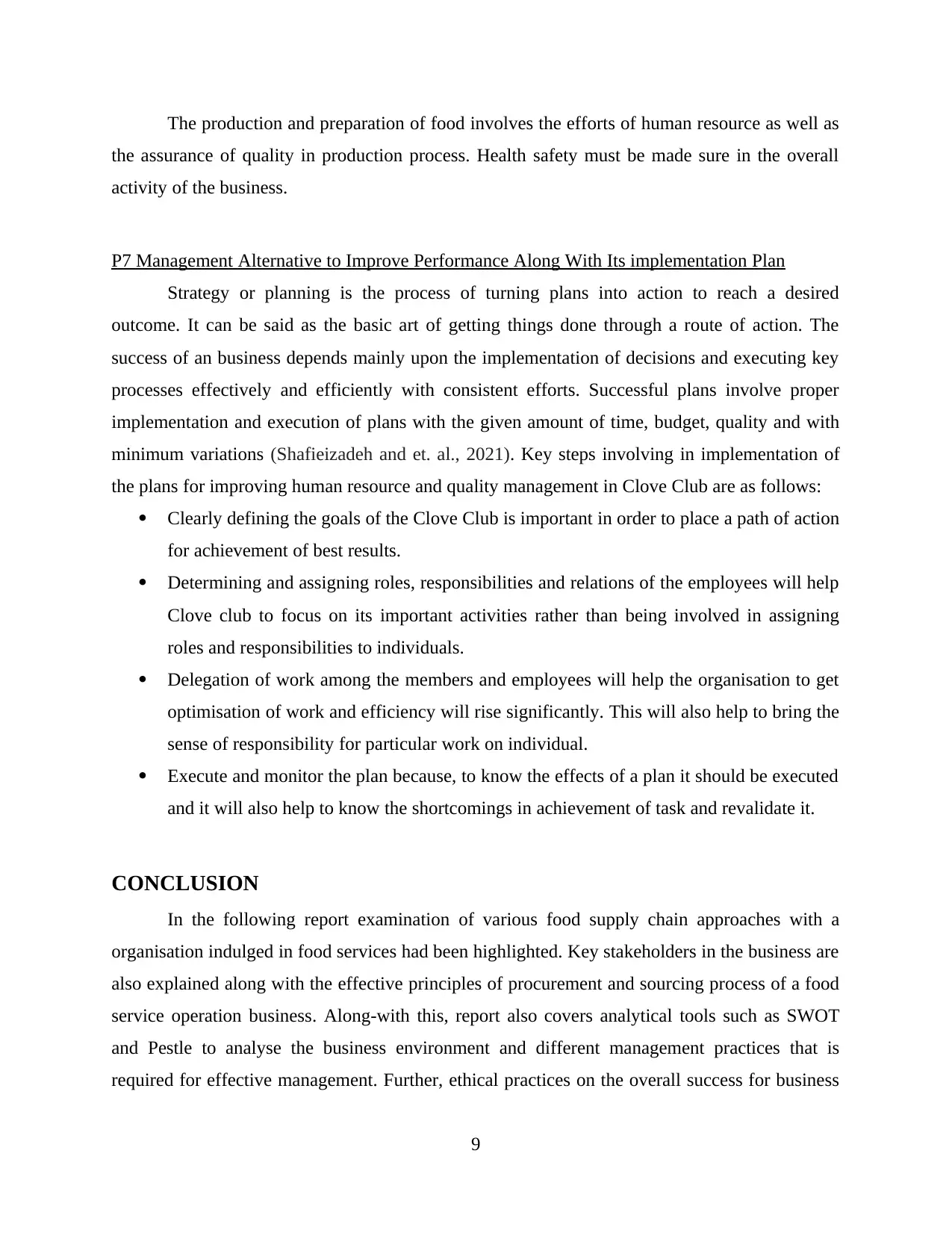
The production and preparation of food involves the efforts of human resource as well as
the assurance of quality in production process. Health safety must be made sure in the overall
activity of the business.
P7 Management Alternative to Improve Performance Along With Its implementation Plan
Strategy or planning is the process of turning plans into action to reach a desired
outcome. It can be said as the basic art of getting things done through a route of action. The
success of an business depends mainly upon the implementation of decisions and executing key
processes effectively and efficiently with consistent efforts. Successful plans involve proper
implementation and execution of plans with the given amount of time, budget, quality and with
minimum variations (Shafieizadeh and et. al., 2021). Key steps involving in implementation of
the plans for improving human resource and quality management in Clove Club are as follows:
Clearly defining the goals of the Clove Club is important in order to place a path of action
for achievement of best results.
Determining and assigning roles, responsibilities and relations of the employees will help
Clove club to focus on its important activities rather than being involved in assigning
roles and responsibilities to individuals.
Delegation of work among the members and employees will help the organisation to get
optimisation of work and efficiency will rise significantly. This will also help to bring the
sense of responsibility for particular work on individual.
Execute and monitor the plan because, to know the effects of a plan it should be executed
and it will also help to know the shortcomings in achievement of task and revalidate it.
CONCLUSION
In the following report examination of various food supply chain approaches with a
organisation indulged in food services had been highlighted. Key stakeholders in the business are
also explained along with the effective principles of procurement and sourcing process of a food
service operation business. Along-with this, report also covers analytical tools such as SWOT
and Pestle to analyse the business environment and different management practices that is
required for effective management. Further, ethical practices on the overall success for business
9
the assurance of quality in production process. Health safety must be made sure in the overall
activity of the business.
P7 Management Alternative to Improve Performance Along With Its implementation Plan
Strategy or planning is the process of turning plans into action to reach a desired
outcome. It can be said as the basic art of getting things done through a route of action. The
success of an business depends mainly upon the implementation of decisions and executing key
processes effectively and efficiently with consistent efforts. Successful plans involve proper
implementation and execution of plans with the given amount of time, budget, quality and with
minimum variations (Shafieizadeh and et. al., 2021). Key steps involving in implementation of
the plans for improving human resource and quality management in Clove Club are as follows:
Clearly defining the goals of the Clove Club is important in order to place a path of action
for achievement of best results.
Determining and assigning roles, responsibilities and relations of the employees will help
Clove club to focus on its important activities rather than being involved in assigning
roles and responsibilities to individuals.
Delegation of work among the members and employees will help the organisation to get
optimisation of work and efficiency will rise significantly. This will also help to bring the
sense of responsibility for particular work on individual.
Execute and monitor the plan because, to know the effects of a plan it should be executed
and it will also help to know the shortcomings in achievement of task and revalidate it.
CONCLUSION
In the following report examination of various food supply chain approaches with a
organisation indulged in food services had been highlighted. Key stakeholders in the business are
also explained along with the effective principles of procurement and sourcing process of a food
service operation business. Along-with this, report also covers analytical tools such as SWOT
and Pestle to analyse the business environment and different management practices that is
required for effective management. Further, ethical practices on the overall success for business
9
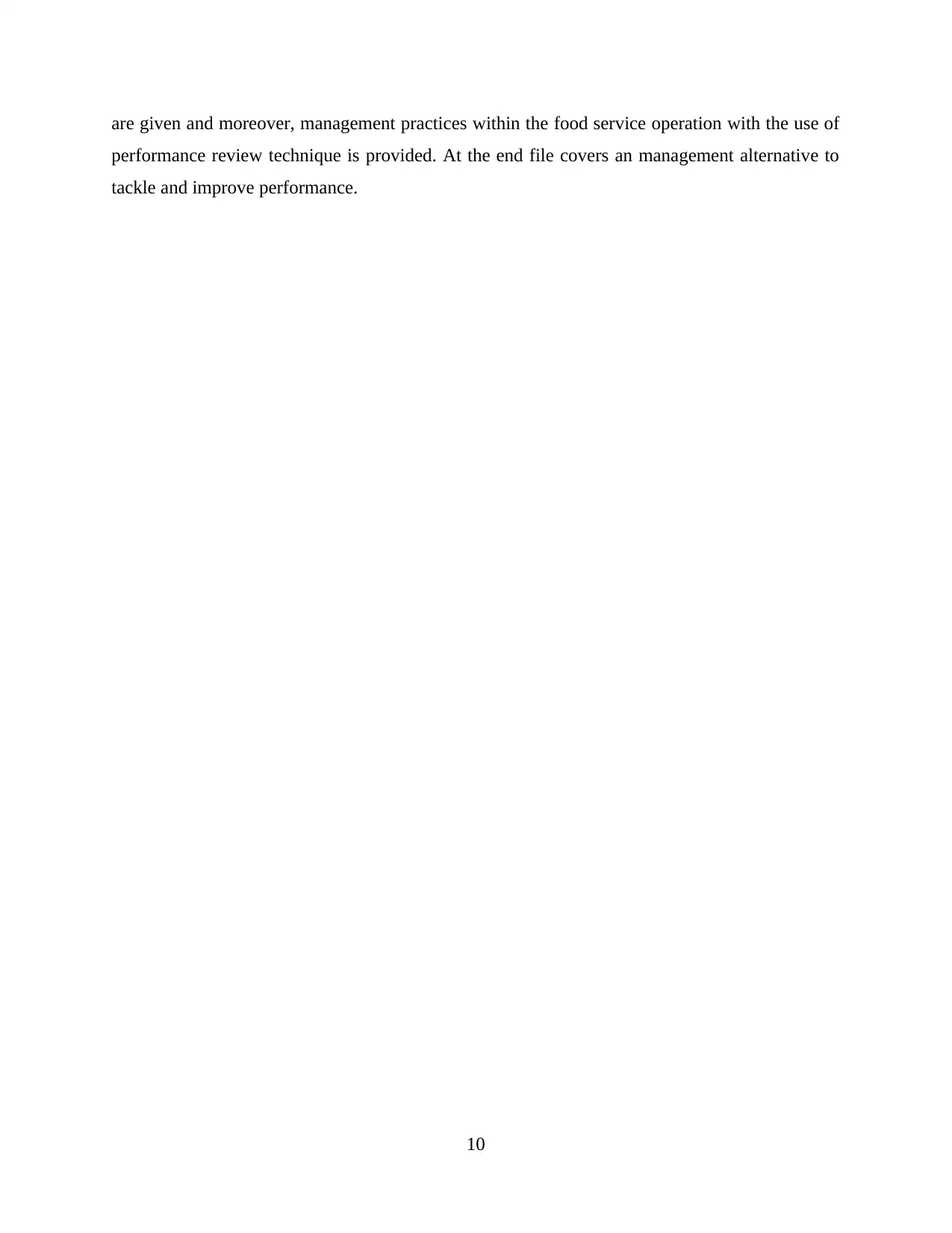
are given and moreover, management practices within the food service operation with the use of
performance review technique is provided. At the end file covers an management alternative to
tackle and improve performance.
10
performance review technique is provided. At the end file covers an management alternative to
tackle and improve performance.
10
⊘ This is a preview!⊘
Do you want full access?
Subscribe today to unlock all pages.

Trusted by 1+ million students worldwide
1 out of 14
Related Documents
Your All-in-One AI-Powered Toolkit for Academic Success.
+13062052269
info@desklib.com
Available 24*7 on WhatsApp / Email
![[object Object]](/_next/static/media/star-bottom.7253800d.svg)
Unlock your academic potential
Copyright © 2020–2026 A2Z Services. All Rights Reserved. Developed and managed by ZUCOL.



